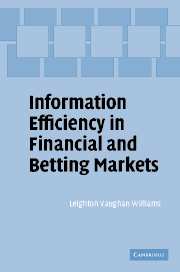Book contents
- Frontmatter
- Contents
- List of figures
- List of tables
- List of contributors
- Introduction
- Part I The concept of information efficiency
- Part II Selected readings
- 4 An assessment of quasi-arbitrage opportunities in two fixed-odds horse-race betting markets
- 5 The presence of favourites and biases in bookmakers' odds
- 6 Searching for semi-strong form inefficiency in the UK racetrack betting market
- 7 Models, markets, polls and pundits: a case study of information efficiency
- 8 Longshot bias: insights from the betting market on men's professional tennis
- 9 Biases and insider trading in exotic bets on thoroughbreds
- 10 On the improbability of information efficient parimutuel betting markets in the presence of heterogeneous beliefs
- 11 Modelling gambling demand in a laboratory casino: discovering the importance of individual-specific effects
- 12 Market efficiency of the 50–30–20–10 horse-racing spread betting market
- 13 Insider trading and bias in a market for state-contingent claims
- 14 Rationality and efficiency in lotto games
- 15 Efficiency of the odds on English professional football matches
- 16 Modelling distance preference in flat racing via average velocity
- 17 Testing for market efficiency in gambling markets: some observations and new statistical tests based on a bootstrap method
- 18 Information (in)efficiency in prediction markets
- Index
- References
5 - The presence of favourites and biases in bookmakers' odds
Published online by Cambridge University Press: 09 July 2009
- Frontmatter
- Contents
- List of figures
- List of tables
- List of contributors
- Introduction
- Part I The concept of information efficiency
- Part II Selected readings
- 4 An assessment of quasi-arbitrage opportunities in two fixed-odds horse-race betting markets
- 5 The presence of favourites and biases in bookmakers' odds
- 6 Searching for semi-strong form inefficiency in the UK racetrack betting market
- 7 Models, markets, polls and pundits: a case study of information efficiency
- 8 Longshot bias: insights from the betting market on men's professional tennis
- 9 Biases and insider trading in exotic bets on thoroughbreds
- 10 On the improbability of information efficient parimutuel betting markets in the presence of heterogeneous beliefs
- 11 Modelling gambling demand in a laboratory casino: discovering the importance of individual-specific effects
- 12 Market efficiency of the 50–30–20–10 horse-racing spread betting market
- 13 Insider trading and bias in a market for state-contingent claims
- 14 Rationality and efficiency in lotto games
- 15 Efficiency of the odds on English professional football matches
- 16 Modelling distance preference in flat racing via average velocity
- 17 Testing for market efficiency in gambling markets: some observations and new statistical tests based on a bootstrap method
- 18 Information (in)efficiency in prediction markets
- Index
- References
Summary
Introduction
There is an extensive literature on the well-known longshot-favourite bias in the odds offered by bookmakers on horse-races, see Figgis (1951), Dowie (1976), Royal Commission on Gambling (1978), Tuckwell (1983), Crafts (1985), Henery (1985), Bird and McCrae (1987), Shin (1991, 1992, 1993), Jullien and Salanié (1994), Vaughan Williams and Paton (1997, 1998) and the authoritative survey by Vaughan Williams (1999). The motivation of this short chapter is to consider the empirical evidence and theory behind the proposition that the odds offered on a horse by bookmakers will depend on the other horses in the race. Past empirical evidence and theory appears not to have considered that the odds offered on a horse may depend on the other horses in the race.
Intuitively, one might expect that the most likely horse to affect the odds offered on other horses is the favourite. The odds on favourites vary from as little as 25 to 1 on to as much as 14 to 1 against. The bias in very short odds is minimal but for less strong favourites the bias is greater. It is suggested that strength of favourite may affect the degree of bias in the odds offered on other horses. On the basis of British flat horse-race statistics for 1993, it is shown that the degree of bias in odds offered on horses is positively related to the presence of strong favourites. Two possible explanations are proposed for this relation.
- Type
- Chapter
- Information
- Information Efficiency in Financial and Betting Markets , pp. 172 - 178Publisher: Cambridge University PressPrint publication year: 2005



